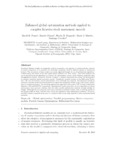Enhanced global optimization methods applied to complex fisheries stock assessment models

Use this link to cite
http://hdl.handle.net/2183/27611
Except where otherwise noted, this item's license is described as Atribución-NoComercial-SinDerivadas 3.0 España
Collections
- Investigación (FIC) [1615]
Metadata
Show full item recordTitle
Enhanced global optimization methods applied to complex fisheries stock assessment modelsDate
2019-04Citation
David R. Penas, Andrés Gómez, Basilio B. Fraguela, María J. Martín, Santiago Cerviño, Enhanced global optimization methods applied to complex fisheries stock assessment models, Applied Soft Computing, Volume 77, 2019, Pages 50-66, ISSN 1568-4946, https://doi.org/10.1016/j.asoc.2019.01.012.
Abstract
[Abstract]
Statistical fisheries models are frequently used by researchers and agencies to understand the behavior of marine ecosystems or to estimate the maximum acceptable catch of different species of commercial interest. The parameters of these models are usually adjusted through the use of optimization algorithms. Unfortunately, the choice of the best optimization method is far from trivial. This work proposes the use of population-based algorithms to improve the optimization process of the Globally applicable Area Disaggregated General Ecosystem Toolbox (Gadget), a flexible framework that allows the development of complex statistical marine ecosystem models. Specifically, parallel versions of the Differential Evolution (DE) and the Particle Swarm Optimization (PSO) methods are proposed. The proposals include an automatic selection of the internal parameters to reduce the complexity of their usage, and a restart mechanism to avoid local minima. The resulting optimization algorithms were called PMA (Parallel Multirestart Adaptive) DE and PMA PSO respectively. Experimental results prove that the new algorithms are faster and produce more accurate solutions than the other parallel optimization methods already included in Gadget. Although the new proposals have been evaluated on fisheries models, there is nothing specific to the tested models in them, and thus they can be also applied to other optimization problems. Moreover, the PMA scheme proposed can be seen as a template that can be easily applied to other population-based heuristics.
Keywords
Global optimization
Parallel programming
Marine ecosystem models
Particle Swarm Optimization
Differential evolution
Parallel programming
Marine ecosystem models
Particle Swarm Optimization
Differential evolution
Editor version
Rights
Atribución-NoComercial-SinDerivadas 3.0 España
ISSN
1568-4946
1872-9681
1872-9681






